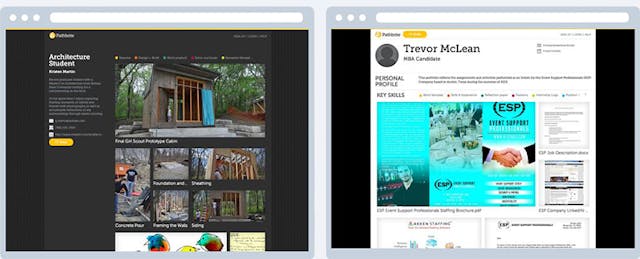Pathbrite, a SF-based startup behind a “Portfolio Learning Platform,” has raised $3.7 million from some very peculiar investors. Leading the round is Cengage Learning, which just came out from bankruptcy after reaching an agreement to eliminate billions of dollars in debt.
“It’s a good signal that a company that has been forced to change a lot of its strategy has chosen us as its first investment” after coming out of bankruptcy, Hiles tells EdSurge. As part of the this deal, Pathbrite will be made available to students who use MindTap, an online learning platform from Cengage that is used in over 750 colleges.
Cengage currently sells MindTap to individual faculty members, while Pathbrite’s business model focuses on institutional sales. The two companies will also have a “referral agreement” (in the words of Hiles) whereby faculty members on MindTap can get administrators to purchase a school-wide Pathbrite license.
Another investor is ACT, the nonprofit behind the standardized tests that many students take as part of the college application process. ACT was also an investor in Pathbrite’s previous $4M raise in March 2013. (The company has now raised nearly $12 million since its start in 2012.)
Hiles admits its a little “ironic” to have ACT as an investor. But she sees the investment as a sign that even assessment organizations recognize the need to evaluate a student's learning potential and work-readiness in a more holistic manner.
Pathbrite allows users to create a “modern learning portfolio” that reflects their skills and experiences gained in schools, jobs, communities, athletics, volunteering and practically any learning opportunity. The company currently boasts over 500 schools as customers, with over 90% in higher education.
In addition to expanding its customer base to schools outside the U.S., the company will “build bridges into the corporate environment,” says Hiles. “What employers care about is common sense, critical thinking, communication, collaboration. They’re not obsessing over, ‘What was your test score in this class?' They are more concerned with the baseline capabilities that you need to have when you hit the ground running in your first day of work.”
Companies will be able to create “templates” for job openings, where they outline the responsibilities, skills and experience of the ideal candidate, as well as the hypothetical tasks in a typical workday. Students will be able to map their own skills, based on their Pathbrite portfolio, to these job requirements and get feedback on how well-qualified they are for the position. The company will disclose its “employer advisory board” sometime in the fall and rollout this service early next year.
Pathbrite is not the only company promising a better way to demonstrate and communicate skills. A host of startups--and even LinkedIn--are also trying to “disrupt” the traditional résumé by using badges, micro-credentials and digital certificates to showcase the informal learning that happens both in and out of the classroom.
“Employers are less and less inclined to look at student transcripts,” says Hiles. “And degrees are starting to mean less and less.”


